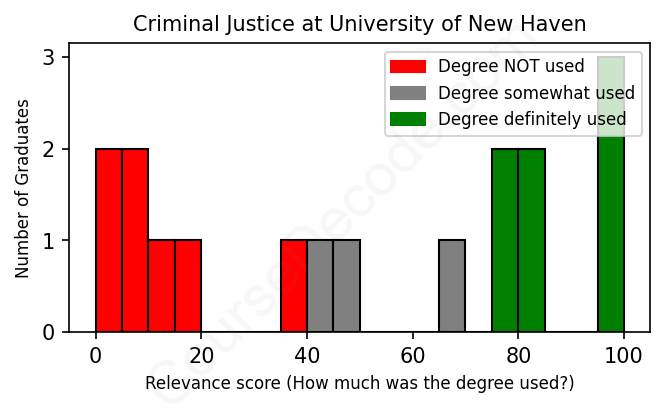
First, some facts. Of the Criminal Justice graduates from University of New Haven we've analyzed , here's how many have used (or NOT used) their degree in their career:

These are estimates based on AI analysis of 17 LinkedIn profiles (see below).
The verdict? Significantly below average. Overall, with an average relevance score of 49%, Criminal Justice graduates from University of New Haven have a much lower likelihood (-18%) of finding work in this field compared to the average graduate across all fields:
And for comparison, here's the chart for all profiles we've looked at across all degrees.
Also, after graduating, 58% of these graduates have pursued further education other than another Bachelor's degree (such as a Masters degree or other), compared to the average across all profiles of 35%. This suggests you may need more than just a Bachelors degree to be competitive as a Criminal Justice graduate.
See the details:
|
Relevance score: 75% We think this person has gone into a career highly relevant to their degree. We think this person has gone into a career highly relevant to their degree.
DEGREE INFOGraduated in 2014 from University of New Haven with a Bachelor's Degree in Criminal Justice. Also pursued further education since (see below). JOB HISTORY SINCE GRADUATIONPreventative Case Planner Arab-American Family Support Center of New York Sep 2014 - May 2015 Vocational Training and Support Specialist  The Kennedy Center Inc. Jun 2015 - Sep 2015 Policy Intern  Center for the Study of Social Policy Sep 2015 - May 2016 Quality Improvement Specialist  SCO Family of Services Jul 2016 - Sep 2017 Compliance Manager  Ascentria Care Alliance Sep 2017 - Jan 2020 Management Analyst  MA Department of Children and Families Jul 2020 - Present FURTHER DEGREES DONE SINCE GRADUATINGMaster of Social Work (M.S.W.)Columbia University in the City of New York 2014 - 2016 ABOUTWhile completing a Master of Science in Social Work at Columbia School of Social Work, my studies focused on policy research and analysis. The coursework exposed me to a variety of research techniques and tools, such as SPSS, STATA, and R, that I have been able to utilize both in and outside of the classroom. I completed coursework on the subject of federal and state policy analysis and practiced specific analytic methods including research briefs, policy briefs, policy memos, cost-benefit analysis, and program evaluation. I have been able to apply these concepts to the work I've done in the field. |
The top 10 most common jobs done by the graduates we've analyzed (ranked most common to least) are:
Looking at the job paths of folks who graduated with a Criminal Justice degree from the University of New Haven, it seems like there’s a mix when it comes to how relevant their jobs are to the field. Many of these graduates have landed roles that don’t really tap into their criminal justice training. For instance, positions like Case Manager or Communications Specialist, while they might involve some soft skills or understanding of human behavior, don’t require specific knowledge from their degree. Even roles in healthcare or business, like a BSA Analyst or Operations Supervisor, seem to stray far from the core competencies you’d expect from a Criminal Justice background.
However, there’s a silver lining. Some of the graduates do take on roles that are very much in line with their studies, especially in legal or emergency management areas. Positions such as a Police Officer, Emergency Dispatcher, or Litigation Assistant definitely leverage the skills linked to their degree. Plus, roles like a Youth Counselor and various emergency management positions show that there are applications of their education in social services and emergency response. So, while there’s a noticeable chunk of graduates who drift into unrelated fields, there are definitely solid pathways where their degree shines bright.
Here is a visual representation of the most common words in job titles for Criminal Justice graduates (this is across all Criminal Justice graduates we've analyzed, not just those who went to University of New Haven):

Looking at the career trajectories of graduates from the University of New Haven with a degree in Criminal Justice, it seems like they typically start off with a mix of roles. Many of them land jobs in related fields, like case management, security, or roles in the legal sector right after graduation. For instance, graduates from 2010 and 2012 jumped into positions related to banking security and law, which shows a good alignment with their degree. Others explored various sectors, including education and health services, which could mean they’re leveraging their skills in broader contexts, but might not be strictly within criminal justice right away.
Fast forward five or ten years, and you see a mix of continued growth in relevant careers and some shifts into other industries. Many have advanced into managerial or specialized roles, like a Client Solutions Director or Emergency Management Specialist. However, there are also several graduates who ventured into roles that don’t directly align with criminal justice, like digital marketing or administrative positions. This could indicate that while the degree provides a strong foundation, it doesn't restrict graduates to strictly criminal justice roles. Overall, while some graduates have found solid paths in their field, others have branched out into different areas, reflecting a pretty varied career landscape for these alumni.
Honestly, the Bachelor’s degree in Criminal Justice at the University of New Haven is about what you’d expect—it’s challenging, but not intimidatingly so. You’ll dive into a mix of theory and practical knowledge, covering everything from criminology to law enforcement to the justice system. It definitely requires a decent amount of reading, writing, and critical thinking, but it’s manageable if you stay organized and engaged with your classes. Overall, it's not necessarily harder than an average degree, but you do need to be ready to put in some effort to get the most out of it. Just keep up with your assignments and be active in discussions, and you should do just fine!
Most commonly, in the LinkedIn profiles we've looked at, it takes people 4 years to finish a Bachelor degree in Criminal Justice.
When you look at the job paths of these Criminal Justice grads from the University of New Haven, it seems like their paychecks are all over the place. Some earlier graduates ventured into roles like case management and communications but ended up bouncing around to less lucrative positions. On the other hand, a few have climbed the ladder into pretty decent roles—like bank security officer and project managers—which likely fetch better salaries. The more recent grads still look like they’ve got a mix, with some working in entry-level roles while others have found gigs that pay better, especially in emergency management and banking. Overall, it seems like there’s potential to make solid money, but it really depends on which paths they chose.
Here is a visual representation of the most common words seen in the "about" section of LinkedIn profiles who have a Bachelor degree in Criminal Justice (this is across all Criminal Justice graduates we've analyzed, not just those who went to University of New Haven). This may or may not be useful:

Here are all colleges offering a Bachelor degree in Criminal Justice (ordered by the average relevance score of their Criminal Justice graduates, best to worst) where we have analyzed at least 10 of their graduates: